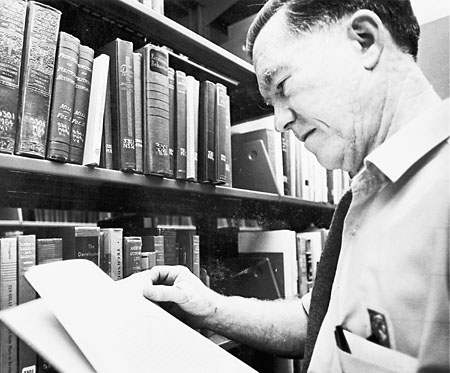Ralph James Salisbury was an Oregon poet, author, editor, and teacher. He is the author of eleven books of poetry, including Rainbows of Stone (2000), an Oregon Book Award finalist; three books of short fiction; and a memoir, So Far, So Good (2013). His work reflects his Native American and Irish heritage, his pacifism, and what he describes as a “devotion to harmony with nature.” A winner of the Northwest Poetry Award, he was also a Rockefeller Foundation Resident at the Villa Serbelloni in Bellagio, Italy. He was professor emeritus of English at the University of Oregon, where he began teaching in 1960.
Salisbury was born in Arlington, Iowa, in 1926 to a Cherokee father and an Irish American mother, who raised him on a farm with no electricity or running water. He enlisted in the U.S. Air Force when he was seventeen years old, and his service in World War II had a significant impact on his work and his life. Themes of violence and pacifism appear throughout his poems, and he is known for his opposition to armed conflicts, from the Korean War to the 2003 invasion of Iraq.
After leaving the Air Force, Salisbury attended North Iowa Teachers College on the G.I. Bill and later the University of Iowa, where he studied under the poet Robert Lowell and earned a master of fine arts degree. From 1960 to 1994, he taught at the University of Oregon, where he mentored several noted writers, including television screenwriter Stephen J. Cannell and award-winning author Marilyn Krysl.
Salisbury's identity as a poet of mixed ancestry is a major component of his work. Expressing his belief that he is of “the Tribe of the World,” he wrote that he is “not part Indian, part white, but wholly both.” While he has endeavored to preserve his cultural background as a Native American, the goal of his work has been to celebrate the connections among many cultures. "My work," Salisbury said, “is offered to the spirit of human goodness, which unites all people in the eternal struggle against evil, a struggle to prevail against global extinction.”
Salisbury was editor-in-chief of Northwest Review (1965-1970) and performed editorial work for two publications that celebrate Native American writing, A Nation Within (1983) and Yellow Medicine Review (2009-2010). He received three Fulbright professorships to Germany and Norway and an Amparts lectureship in India, and was honored with the 2015 C.E.S. Wood Distinguished Writer Award by Literary Arts. According to Krysl, Salisbury’s work “embodies the anguish of human beings whose mixed ancestry plays a crucial role in their poverty, failures of confidence, and alienation.” Salisbury and his wife, poet Ingrid Wendt, lived in Eugene for over fifty years and have three children. Salisbury died on October 9, 2017.
-
![]()
Ralph Salisbury.
Courtesy The Habit of Rainy Nights Press
Related Entries
Map This on the Oregon History WayFinder
The Oregon History Wayfinder is an interactive map that identifies significant places, people, and events in Oregon history.
Further Reading
Salisbury, Ralph. So Far, So Good. Lincoln: University of Nebraska Press, 2013
---. Like the Sun in Storm, poems. Portland, Ore.: Habit of Rainy Nights Press, 2012
---. Light from a Bullet Hole: Poems New and Selected. Eugene, Ore.: Silverfish Review Press, 2009
---. The Indian Who Bombed Berlin, stories. Ann Arbor: Michigan State University Press, 2009
---. War in the Genes, poems. Cincinnati, OH: Cherry Grove Editions, 2005.
---. Rainbows of Stone, poems. Tucson: University of Arizona Press, September 2000.
"Ralph Salisbury." The Poetry Foundation. http://www.poetryfoundation.org/bio/ralph-salisbury
Mackay, James and A. Robert Lee, guest editors. "Special issue: Ralph Salisbury." Transmotion. Vol. 6, No. 1 (2020).


